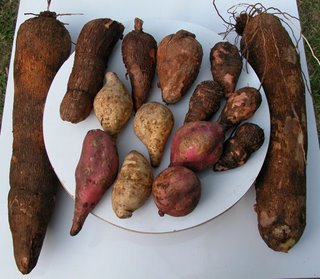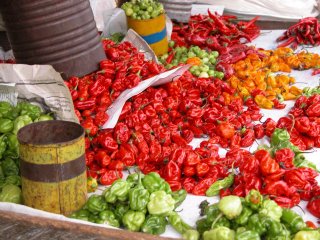Diet, Diabetes and Health in Africa
 November is "Diabetes Month" and in recognition of "World Diabetes Day" (today, Nov. 14)," BBC Africa has been discussing the topic "Is diet the key to good health?" (in Africa) at their website and also on their program "Have your say." Diabetes is, as is true throughout the world, rapidly on the rise in Africa. Yesterday (Nov. 13), I joined the BBC's hour-long discussion program, where I mentioned the role of aggressive multinational advertising in influencing the tastes and choices of Africans (especially of imported foods), the role of convenience and time constraints on eating habits, and traditional-"modern" and rural-urban differences in what people eat. Also, you can hear interviews with people ordering rice and a beef stir-fry and fried chicken and French fries ("chips" from potatoes) in a restaurant in Accra, or a rural family from Malawi eating nshima (made from corn flour) and a fish relish, as well as practical advice on diet and health from Dr. Ndawula in Kampala, Uganda, and the experiences of
November is "Diabetes Month" and in recognition of "World Diabetes Day" (today, Nov. 14)," BBC Africa has been discussing the topic "Is diet the key to good health?" (in Africa) at their website and also on their program "Have your say." Diabetes is, as is true throughout the world, rapidly on the rise in Africa. Yesterday (Nov. 13), I joined the BBC's hour-long discussion program, where I mentioned the role of aggressive multinational advertising in influencing the tastes and choices of Africans (especially of imported foods), the role of convenience and time constraints on eating habits, and traditional-"modern" and rural-urban differences in what people eat. Also, you can hear interviews with people ordering rice and a beef stir-fry and fried chicken and French fries ("chips" from potatoes) in a restaurant in Accra, or a rural family from Malawi eating nshima (made from corn flour) and a fish relish, as well as practical advice on diet and health from Dr. Ndawula in Kampala, Uganda, and the experiences of  diabetes patient Joseph Kibuuka.
diabetes patient Joseph Kibuuka.Just as a couple of minor comments: the husband in Malawi, describing their meal said "but, unfortunately we don't have any vegetables" with the nshima. He knew the meal contained protein (the fish) and carbohydrates (corn). However, later he mentioned the sauce "to make it more appetizing" included onions and tomatoes. Onions and tomatoes qualify as vegetables. Also, as a minor point of clarification: one of the commentators mentioned that ugali, sadza, and nisma or nshima are all basically the same, and banku is the version in Ghana. It is my understanding that banku is the only one of those that is made from fermented corn dough, which is a notable distinction between them.
The BBC program touches on many important points: the role of exercise and physical activity, controlling portion sizes, advantages and disadvantages of processed and unprocessed foods, different effects of different types of cooking techniques (frying, boiling, steaming, etc.), role of convenience and cost in choosing foods, importance of fruits, vegetables, and drinking water, different types of protein resources. . .This is a very timely and urgent topic throughout Africa. I recommend checking these BBC resources out.
I wish I'd had time to talk about the positive traditional cultural image in Western Africa of the literally "big man" or "big woman," a nurturing, generous, successful, healthy, wealthy person, vs. the image of a "skinny" person as stingy, poor, and likely unhealthy. To be "fat" has historically been a good thing. That image is changing, but it still had a role in the fight against diabetes.
Labels: african diet, diabetes, health and diet in Africa, Ndawula

